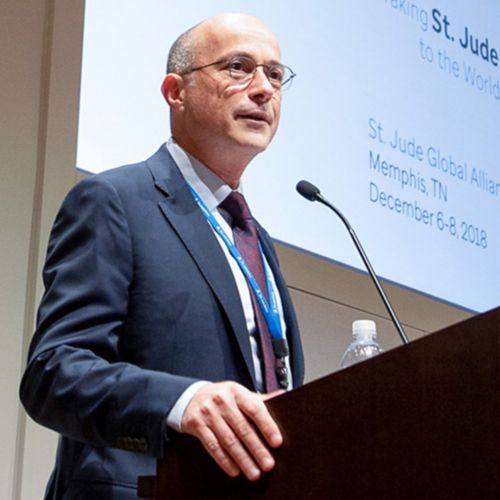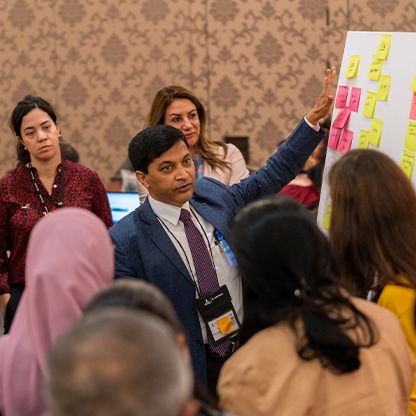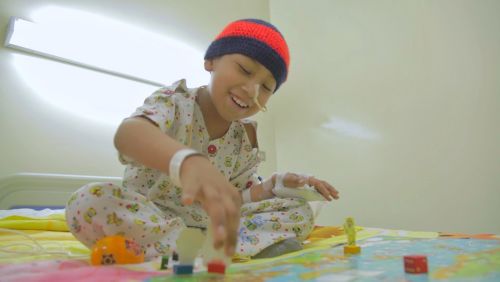St. Jude Family of Websites
Explore our cutting edge research, world-class patient care, career opportunities and more.
St. Jude Children's Research Hospital Home

- Fundraising
St. Jude Family of Websites
Explore our cutting edge research, world-class patient care, career opportunities and more.
St. Jude Children's Research Hospital Home

- Fundraising
Global Scholar: Dr.__Kirtikumar Rathod
Other Global Scholars Projects:
Dr. Rathod Looks to Technology to Reduce Gaps in Care
Dr. Kirtikumar Rathod isn’t sure exactly when the idea first struck him, but the inspiration was right there at his fingertips. Why not, he thought, use smartphone technology to improve children’s access to hospital care?
Maybe the seeds of the idea were planted one day as he used an app on his phone to schedule a ride home. Maybe the idea began to take shape as he mulled over his next meal and the possibility of using an app to have dinner delivered from a nearby restaurant.
“It’s so easy,” the pediatric surgeon says now. “You just click, and it’s there. And that’s in India as well. It’s very easy. I can get all meals right now in my house. But if I want to take my child to the hospital, oh, it’s a challenge.”
As Dr. Rathod earned his Master of Science in Global Child Health, it was the confluence of those two thoughts — the ease and power of smartphone technology and the challenges involved in seeking and getting hospital care for children — that ultimately sparked the idea behind his Global Scholars project.
The project examines using smartphone technology in the form of artificial intelligence chatbots or apps to improve access to surgical care for children in India. It seeks to address a problem that Dr. Rathod commonly sees in Jodhpur, India, where he serves as additional professor of pediatric surgery at the All India Institute of Medical Sciences Jodhpur.

Dr. Kirtikumar Rathod is working to harness artificial intelligence to give people more access to health care so they know when a child symptoms require immediate attention.
AIIMS Jodhpur is a relatively new, government-sponsored hospital that treats children younger than the age of 1 for free. The cost for treating other children is also significantly reduced. But Dr. Rathod was continually struck by the fact that “we are not getting as many patients as we should get.”
He sees transportation as one hurdle that prevents some families from getting to the hospital. In other cases, the hurdles are distance and time: Seeking treatment can sometimes require a lengthy trip and a parent’s taking time off from work. But the biggest issue Dr. Rathod sees is a lack of awareness about which symptoms require immediate attention.
“People don’t know when to come to the hospital,” he says. “Sometimes they come very late. Sometimes they come very soon. Most of the time, they come very late. And sometimes, for unnecessary reasons, they call [for an] emergency, which is true in the U.S. as well, and the UK as well.”
Dr. Rathod’s technology would seek to address those gaps in awareness.
He envisions a chatbot feature on the popular messaging app “WhatsApp” that enables parents and others to check their child’s symptoms in their native language. If needed, the feature would then connect a parent to a map of nearby facilities, as well as to transportation, such as an ambulance, to get the child to the hospital.
“This is technology, and it’s easy, it’s cheap, or often it’s free,” he says. “I think there is a potential [for] this thing – and not [just] in my country, in all the countries. You can order food, Amazon, all those things. Why not health care online?”
Finding ways to help the children in his native India has long been a goal for Dr. Rathod, who returned home in 2017 after stints in the Middle East and the United Kingdom.
He grew up in the remote city of Dhule, where there were no full-time teachers and about half of his secondary education was ultimately self-taught. Early on, entranced by grade-school books about the planets, he dreamed of becoming an astronaut. “Everyone wants to become an astronaut when they’re in primary school, I think,” he says with a laugh.
But his love of science and a shifting interest toward plants and animals led him to the field of medicine — and eventually, to the specialty of surgery. (“It happens in front of you,” he says, when asked what drew him to surgery. “It works; it doesn’t work. It’s in front of you.”)
In medical school, he was drawn to the government hospital affiliated with the college. Where some students would return home at the end of the day, he spent as many nights as he could helping out in the hospital, gaining experience with IVs, catheterizations, dressing changes, and the patients themselves.
In 2011, Dr. Rathod received the Best Young Researcher Award in Pediatric Surgery from the Indian Association of Paediatric Surgeons. And now he helps guide the next generation of pediatric surgeons in the delicate procedures involving infants and children, including how to safely handle the fragile tissues of these young patients.
“The technique to work with these delicate tissues, it is really important, how to handle them, how to touch them,” he says. “It’s like a fresh rose. … Or maybe a crystal, which falls and it breaks.
“I keep telling my residents and my students that these things are very delicate. It’s like you have to be really careful, very gentle. Think as if it’s your body part. … Imagine your body part, which is very sensitive, and you just touch it. So deal with this baby like that, and we’ll be all right.”
More often these days Dr. Rathod supervises as his residents take the lead on surgeries. But he’ll still lead the more major operations. For instance, he performed surgery on a young child whose food pipe had not developed. In another case, he led a 12-hour surgery to remove a large tumor from an 8-month-old’s liver. Although that child lost a lot of blood and was temporarily blind after the operation, his vision was restored within a few weeks, and he’s now doing well two years after the surgery. Dr. Rathod has received reports of the child out playing with friends.
“It’s certainly special,” he says, of hearing updates on his former patients.
And with an assist from the latest smartphone technology, Dr. Rathod hopes his team will soon have the opportunity to help even more.


